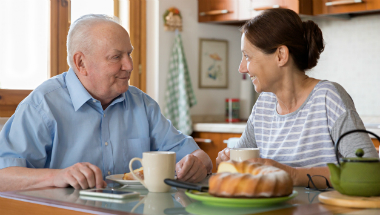National Institute for Health and Clinical Excellence (NICE)
|
|
NICE says not to give up on people trying to be independent after hospital discharge or in their own homes
NICE is urging health and social care staff to support people to safely continue with everyday activities such as climbing stairs, dressing themselves or cooking after a period of illness or if they have been struggling at home.

In a new guideline on ‘intermediate care’ issued recently NICE has set out how health and social care staff can support people to be independent following a hospital stay or when daily life at home becomes too difficult.
The new guideline covers how to assess intermediate care needs, including setting goals with the person so that they can overcome the problems they are experiencing.
NICE says staff should talk openly about any risks but in a positive manner so as not to discourage people. The aim is to ensure that people can confidently get on with the things they would like to do themselves whilst any risks are discussed and managed safely.
Dee Christie, who chaired the guideline committee, is an occupational therapist with over has 35 years' experience running intermediate care services, said: “There is a lot we can do to support people after illness, or when things get more difficult at home so no one should give up on their independence. If we focus on people's strengths and help them realise their potential they can often regain their independence. Intermediate care can specifically design rehabilitation programmes that support people's recovery whether they are at home or in hospital."
The guideline says staff should work with people to find out the best way to carry out activities safely, so they can observe and guide them as they manage the task and not automatically intervene.
NICE says intermediate care is a vital service which helps speed up discharge and reduces hospital admissions.
Dee added: “Providing high-quality intermediate care has the potential to ease the pressures facing the NHS and social care sector. Better support for people and their families to recover fully and regain independence will mean they can quickly return home and stay out of hospital or avoid hospital admission altogether. This will free up hospital beds and reduce reliance on community services."
Intermediate care describes a range of programmes designed to help people recover from illness or to provide support when managing daily activities at home becomes too difficult.
Intermediate care can be provided as part of NHS services in bed-based units attached to hospitals. It can also be delivered in residential care homes or the person’s own home, funded by the local authority social care or NHS services. Intermediate care is a short-term service that should always be provided free of charge.
The Royal College of Occupational Therapists welcomed the guideline, chief executive officer Julia Scott said: “With NHS leaders being warned that this winter could be the most difficult for a generation, it is imperative that they take rapid action to implement NICE’s recommendations in full. Too often, health and care services only deal with a set of symptoms or just the care needs that demand immediate attention, rather than seeing the whole person and focusing the support on what matters to that person. Because of their unique set of skills, occupational therapists are perfectly placed to change this. NICE’s recommendations build on our evidence that shows that intermediate services which take a holistic ‘whole person’ approach deliver better care for service users that is more cost-effective for taxpayers.”
Original article link: https://www.nice.org.uk/news/article/nice-says-not-to-give-up-on-people-trying-to-be-independent-after-hospital-discharge-or-in-their-own-homes


